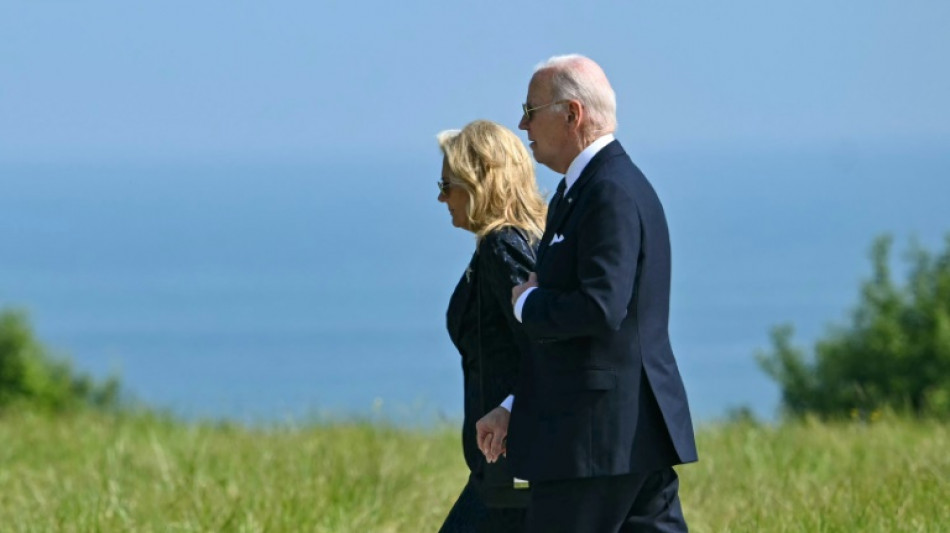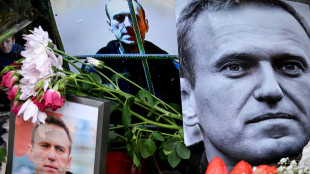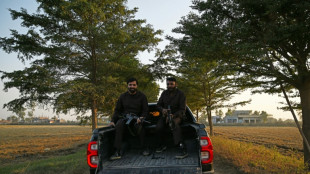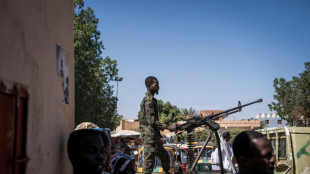
'Unfailing gratitude': Western leaders remember D-Day under Ukraine shadow

Western leaders Thursday on the beaches of northern France marked 80 years since the D-Day landings to liberate Europe from Nazi occupation, mindful of the over two-year war raging again in Europe after Russia's invasion of Ukraine.
US leader Joe Biden, King Charles III of the UK and Canadian Prime Minister Justin Trudeau, representing the Allied powers, paid tribute to the immense sacrifices made by the tens of thousands of troops on the sandy beaches and cliffs of Normandy, often far from their homes, under intense German counter-fire.
"We recall the lesson that comes to us, again and again, across the decades: free nations must stand together to oppose tyranny," King Charles III said at the British memorial at Ver-sur-Mer that overlooks Gold beach, one of the landing sites for British troops.
"Let us pray such sacrifice need never be made again," he said.
"Our gratitude is unfailing and our admiration eternal."
Canadian Prime Minister Justin Trudeau said the world must continue to stand up for democracy.
"Democracy is still under threat today. It is threatened by aggressors who want to redraw borders," he said at the Canadian ceremony in nearby Courseulles-Sur-Mer.
"Our way of life did not happen by accident, and it won't continue without effort."
- 'Obligation to remember' -
With Ukrainian President Volodymyr Zelensky joining the Western leaders in Normandy for an international ceremony, the events will provide a hugely symbolic backdrop to talks on how Ukraine can gain back ground after Russian advances.
No Russian official has been invited, underlining Moscow's pariah status in the West after the invasion of Ukraine in 2022 despite the decisive Soviet contribution to defeating Nazism in World War II.
The most honoured guests are surviving veterans. Around 200 are expected, a number that is dwindling every year with most at least in their late 90s and some older than 100. This may be the final major anniversary where they are present.
British veteran Cecil Newton, who spoke to AFP at the British Memorial in Ver-sur-Mer, said he was upset that so many young men were killed.
"All those who were in action will always be with me, with us. I can see them now," Newton, 100, said.
King Charles noted that veterans were becoming ever fewer in number but added: "Our obligation to remember them, what they stood for and what they achieved for us all can never diminish."
French President Emmanuel Macron, attending the British ceremony, added: "Nobody here in France can forget your sacrifice."
- 'Shying away' -
Biden, born in 1942 during World War II, was expected to promote the United States as a defender of democracy and international alliances, contrasting himself against election rival Donald Trump during a state visit that will last until Sunday.
He was meeting surviving American veterans one-by-one at the American memorial to its victims.
Macron has already sought to break taboos by refusing to rule out sending troops to Ukraine, a position that unsettled some EU allies.
But there have been shifts in recent weeks, with the West showing readiness to allow Ukraine to use Western-provided weapons to strike targets in Russia, and France pushing for the deployment of European military instructors in Ukraine.
During a meeting with foreign news outlets in Saint Petersburg on Wednesday evening, Putin shrugged off the lack of an invitation for Russia, saying "let them celebrate without us".
"They are shying away from inviting Russia, which is the legal successor of the Soviet Union, which has sustained such huge losses," he said, stressing that the Soviet Union lost around 27 million civilians and soldiers in World War II.
The landings by Allied forces, backed by airborne operations that parachuted troops directly onto occupied soil, were the biggest naval operation ever in terms of the number of ships deployed and the troops involved.
In an operation kept secret from the Germans, the Allies landed on five beaches spread across the Normandy coast: Omaha and Utah for the Americans, Gold and Sword for the British and Juno for the British and Canadians.
By the end of what became known as "the longest day", 156,000 Allied troops with 20,000 vehicles had landed in Nazi-occupied northern France despite facing a hail of bullets, artillery and aircraft fire.
A. Lefebvre--BTZ

 London
London

 Manchester
Manchester
 Glasgow
Glasgow
 Dublin
Dublin
 Belfast
Belfast
 Washington
Washington
 Denver
Denver
 Atlanta
Atlanta
 Dallas
Dallas
 Houston Texas
Houston Texas
 New Orleans
New Orleans
 El Paso
El Paso
 Phoenix
Phoenix
 Los Angeles
Los Angeles



